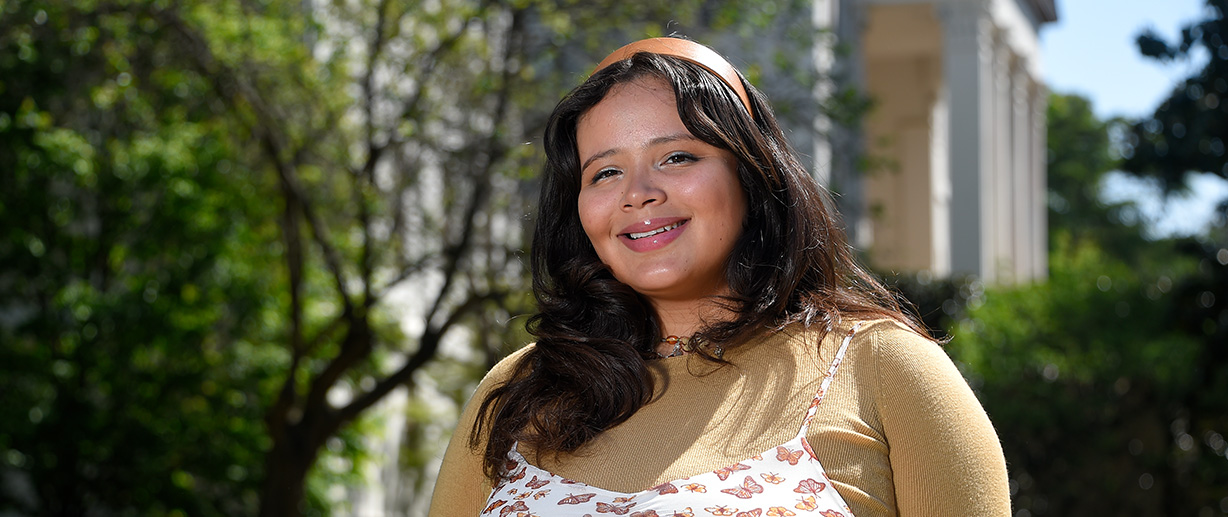Paola Cruz ’23 understands the healing and therapeutic benefits of writing.
Her smartphone has more than 800 notes that capture the moments she’s needed to record thoughts and feelings.
“My mom passed when I was 14,” says Cruz, a double major in sociology and anthropology and Spanish from Charlotte, North Carolina. “The only way I could grieve was by writing. It turned my life around. The social worker told me every time I had a dream about my mom to just write it down.”
Cruz’s mother died from gastric cancer. Her journal entries eventually turned into poems and songs. The writing is inspiring her research as Wofford College’s Presidential International Scholar for the 2022-23 academic year.
Wofford’s Presidential International Scholar is selected by the college’s president. “The student most likely to make a difference in the future” is chosen to conduct independent research in non-traditional locations. Students who have displayed a passion for service learning and a globally minded intellectual curiosity are considered.
“Paola has demonstrated a passion for service, storytelling and a knack for ethnographic interviewing,” says Dr. Nayef Samhat, Wofford’s president. “Presidential Scholars research solutions to challenging issues. They must show resilience, creative problem solving and the ability to adapt, and Paola has shown that during her Wofford experience. She is undertaking an interesting and insightful project, and I look forward to learning more as she shares her research.”
Cruz will travel to Argentina and Honduras to study how storytelling has impacted trajectories of trauma, activism and family. It’s more than an ethnographic project. It’s personal.
Cruz’s father immigrated to the United States from Honduras, and her mom immigrated from El Salvador. She spent four hours interviewing her father for a high school project and learned about his immigration journey.
“We cried together and bonded over his vulnerability in telling me his story,” says Cruz, who wrote a nine-page poem from that interview and said the experience inspired her to become an ethnographer.
Cruz will begin her year as Presidential International Scholar in Argentina, studying with the School for International Training (SIT) Human Rights and Social Movements cohort. She wants to learn about activist efforts and transitional justice through storytelling. While in Argentina, she’ll connect with Memoria Abierta, an alliance of human rights organizations based in Buenos Aires that preserves memories of human rights violations through podcasts and art.
“I can learn from Argentinian activists how to address socio-political trauma through storytelling,” Cruz says.
Then, she’ll travel to Honduras, a country that’s been impacted by gang violence, organized crime, political corruption and military conflicts. She will interview Hondurans, including members of her family, about socio-political trauma and how it’s impacted them and their families.
“To tell stories as a future anthropologist and ethnographer, I believe it is essential to begin with my routes and roots,” Cruz says. “How did we get here? My parents didn’t bring pictures. Poverty didn’t allow them that luxury.”
Each Presidential International Scholar gives a presentation to the campus community upon their return to Wofford. Cruz, a music and vocal performance minor, is considering making her presentation a concert with songs that she’ll write during her year of research in English and Spanish. She’ll produce the songs with the help of Nneka Mogbo ’20, a talent manager who recently launched URU Talent Management and signed Cruz.
She’s currently working with students at Carver Middle School through the college’s Sustainability Seminar on using storytelling and music as a means of empowerment to gain better communication skills while creating a safe space in the classroom. It combines Cruz’s experiences through storytelling and songwriting.
“What stands out to me about Paola’s research proposal – and all projects she is engaging in – is the heart,” says Dr. Alysa Handelsman, assistant professor of sociology and anthropology and Cruz’s faculty advisor during her upcoming year as Presidential International Scholar. “Her heart is in it. She is doing projects that she is passionate about, and she is drawing upon methodologies that she engages in and that, in many ways, have supported her through challenging situations she has lived through. These are not methodologies she’s coming up with because they sound cool, these are methodologies that reflect her lived experience.”
Early in the COVID-19 pandemic, Cruz’s grandmother from Honduras was staying with her family in Charlotte. Gathering for a meal and conversation is a rare occurrence in her family because of work schedules and responsibilities. Her father owns a restaurant. The pandemic, however, allowed them to pause and talk while sharing a meal.
The family talked about Cruz’s uncle, who was born prematurely in the 1980s. Her grandmother had to return to her in-laws’ home and didn’t get to spend much time with her baby in the hospital. It was a difficult time.
“She washed clothes at a creek while postpartum in fear that she was not contributing as a woman in the household, even though she was in physical pain,” says Cruz, who said her grandmother’s husband was on military duty. “My dad said he remembered that creek. He’d skip rocks, pick fruit and play while his mother washed clothes, and it was a good time for him.”
That evening, Cruz wrote a song focused on the contrasting perspectives of that time at the creek. She realized that she could share stories through her songwriting.
“I wrote a song about my dad as an innocent child who watched his mom wash clothes,” Cruz says. “I wrote about his perspective and what she was going through.”
She’s looking forward to discovering more.
“I want to pay it back by telling their story,” Cruz says. “I want other people to identify through the lyrics and melodies.”
